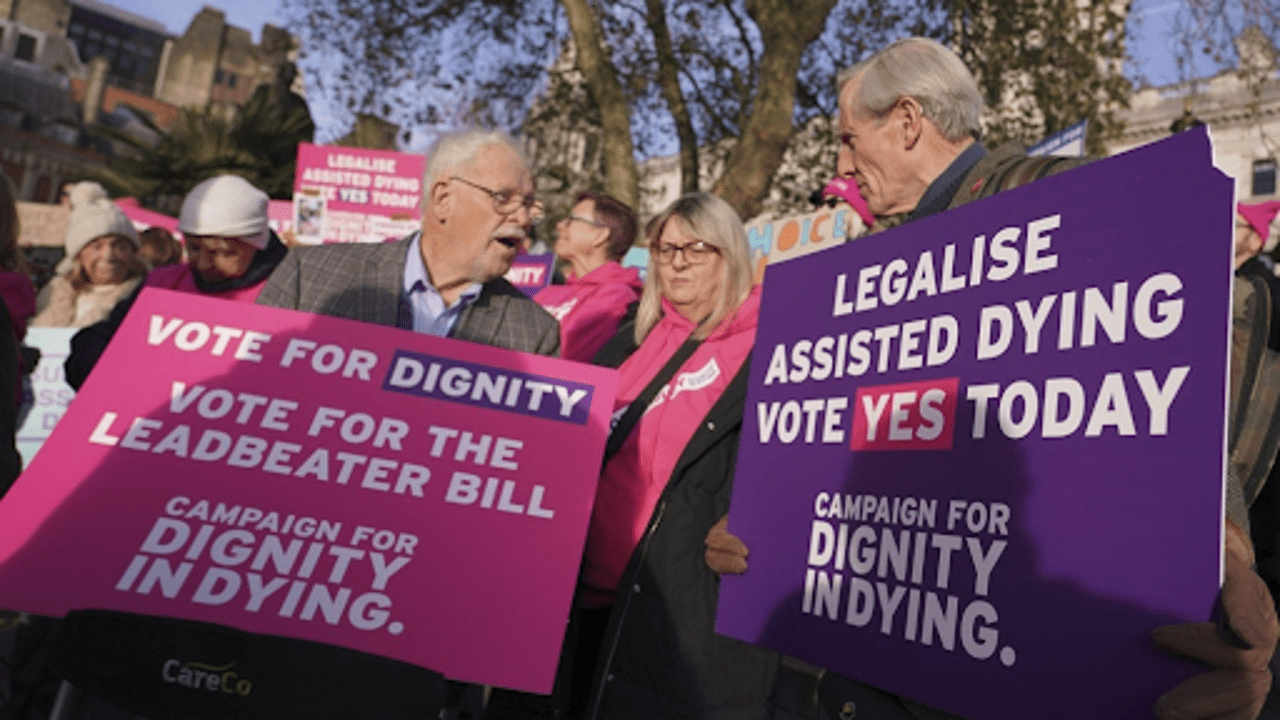
Pro legal assisted dying supporters demonstrate in front of Parliament in London, Friday, Nov. 29, 2024. (AP Photo/Alberto Pezzali)
British lawmakers took a significant step on Friday by granting preliminary approval to a bill that would allow terminally ill adults in England and Wales to choose assisted dying. The decision came after a heartfelt debate in the House of Commons, where members shared personal stories of loss and suffering.
The assisted dying bill passed its first hurdle with a vote of 330 to 275, signaling broad support for the proposal in principle. However, the bill must undergo further scrutiny before a final vote.
During the debate, which spanned several hours, lawmakers discussed complex issues surrounding ethics, religion, and the law. Unlike the often-heated exchanges in Parliament, this debate was marked by solemnity and respect.
Kim Leadbeater, the bill’s sponsor, emphasized its purpose, saying, “This is not about choosing between life and death. It’s about giving dying people a choice about how they die.”
Supporters argued the legislation would ensure dignity and minimize suffering for terminally ill individuals while incorporating safeguards to protect vulnerable groups. Opponents, however, voiced concerns that it could pressure elderly or disabled individuals into ending their lives to avoid burdening others. Some also called for a focus on improving palliative care as an alternative.
The proposed law would allow adults with less than six months to live to seek assistance in ending their lives, provided they can self-administer the medication. The process would require approval from two independent doctors and a High Court judge. The bill does not extend to Scotland or Northern Ireland.
Proponents shared emotional accounts of individuals enduring unbearable pain in their final days or secretly taking their own lives due to the current legal restrictions. Meanwhile, Danny Kruger, who led the opposition, warned against what he called a “state suicide service,” expressing concerns about the potential for coercion despite safeguards. He remained hopeful the bill could still be rejected in future votes.
While the bill was introduced by Labour MP Leadbeater, the vote was non-partisan, with members across political lines forming alliances on both sides. Prime Minister Keir Starmer supported the bill, but some of his Cabinet members, including Health Secretary Wes Streeting, voted against it. Similar divisions were seen in other parties.
Outside Parliament, the debate drew hundreds of demonstrators on both sides. Opponents held signs reading, “Kill the bill, not the ill,” while supporters carried placards stating, “You can’t cure death. Please make it fear-free.” Cheers erupted among backers when the vote result was announced.
Long-time campaigner Esther Rantzen, who is terminally ill with lung cancer, celebrated the outcome, calling it a historic step toward offering people “equal choice” in their final days. Rantzen, who had considered traveling to Switzerland for assisted dying, expressed hope the law would provide a compassionate alternative at home.
Countries like Belgium, Canada, and parts of the U.S. have already legalized assisted suicide, with varying eligibility requirements. Unlike euthanasia, which involves healthcare practitioners directly administering lethal injections, assisted suicide requires patients to take the final action themselves.
As the bill moves forward, questions remain about its potential impact on the NHS, hospice care, and legal frameworks. A final vote is expected in the coming months, leaving the future of assisted dying in England and Wales uncertain.















